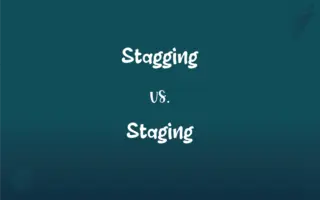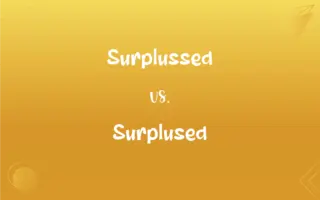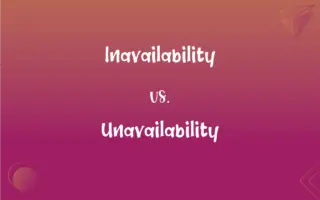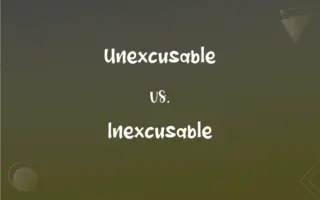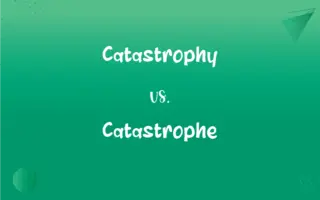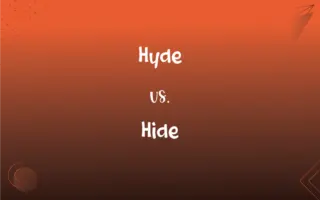Schould vs. Should: Mastering the Correct Spelling
Edited by Aimie Carlson || By Janet White || Updated on March 9, 2024
"Schould" is a misspelling. The correct spelling is "Should," which is a modal verb indicating obligation, duty, or correctness.

Which is correct: Schould or Should
How to spell Should?

Schould is Incorrect

Should is Correct
ADVERTISEMENT
Key Differences
Recall the phrase "should have," which is frequently used and lacks "c."
Link "Should" with "Shall," its counterpart in present tense.
Associate "Should" with "Would" and "Could" for a consistent spelling pattern.
"Should" doesn't need a "c"; think of "shoe" as the starting sound.
Remember "Should I?" not "Schould I?" to emphasize the absence of "c."
ADVERTISEMENT
Correct usage of Should
He thinks he schould win the prize.
He thinks he should win the prize.
I schould study more for the exam.
I should study more for the exam.
Should we call them tonight?
She schould have arrived by now.
She should have arrived by now.
Should you be going now?
Should Definitions
Expressing a recommendation or advice.
You should visit the museum.
Used to indicate obligation or duty.
You should eat your vegetables.
To express expectation or assumption.
She should be here by now.
Indicating a correct or desired state.
This key should open the door.
Suggesting a possibility or likelihood.
It should rain later.
(auxiliary) Ought to; indicating opinion, advice, or instruction, about what is required or desirable.
Used to issue an instruction (traditionally seen as carrying less force of authority than alternatives such as 'shall' or 'must').
You should never drink and drive.
The law is clear that you should always wear a seat belt.
The manual says that this switch should be in the 'off' position.
Used to give advice or opinion that an action is, or would have been, beneficial or desirable.
You should go and see that film. I think you'll enjoy it.
I should exercise more often, but I’m too lazy.
She should not have been so rude.
(informal) With verbs such as 'see' or 'hear', usually in the second person, used to point out something remarkable in either a good or bad way.
You should see his new apartment. It's like a palace!
If you think her piano playing is bad, you should hear her sing!
In questions, asks what is correct, proper, desirable, etc.
What do you think? What should I do?
(auxiliary) Ought to; expressing expectation.
Indicates that something is expected to have happened or to be the case now.
They should have finished by now; I'll call them to check.
My fruit trees should be in flower, but the cold spring has set them back.
Will be likely to (become or do something); indicates a degree of possibility or probability that the stated thing will happen or be true in the future.
They should have it finished by Friday.
When you press this button, the pilot flame should ignite.
You should be warm enough with that coat.
Used to form a variant of the present subjunctive, expressing a state or action that is hypothetical, potential, mandated, etc.
If I should be late, go without me.
Should you need extra blankets, you will find them in the closet.
The man demanded that he should be allowed entry.
I'm surprised that he should say that.
(auxiliary) cap=1.
I told him that I should be busy tomorrow.
(auxiliary) An alternative to would with first person subjects.
Used to express a conditional outcome.
If I had not been so tired, I should have laughed heartily.
Used to impart a tentative, conjectural or polite nuance.
I should imagine that they have arrived by now.
I should think you would apologize.
Used to express what the speaker would do in another person's situation, as a means of giving a suggestion or recommendation.
It's disgraceful the way that they've treated you. I should write and complain.
To make a statement of what ought to be true, as opposed to reality. en
Something that ought to be the case as opposed to already being the case.
Used as an auxiliary verb, to express a conditional or contingent act or state, or as a supposition of an actual fact; also, to express moral obligation (see Shall); e. g.: they should have come last week; if I should go; I should think you could go.
Should Sentences
You should try the chocolate cake; it's delicious.
He should apologize for being so rude.
She should be here any minute now.
You should wear a jacket; it's cold outside.
She should have known better than to trust him.
They should have called before coming.
You should see a doctor if the pain persists.
They should arrive by noon if they left early.
You should take an umbrella; it looks like rain.
We should save some money for emergencies.
He should be more careful with his belongings.
We should reconsider our decision in light of the new information.
They should respect other people's opinions.
You should study the material before the test.
You should always wear a helmet when riding a bike.
She should join us for dinner; it would be nice.
You should brush your teeth twice a day.
She should practice her speech a few more times.
You should check the oil level in your car regularly.
We should take a break; we've been working for hours.
They should have asked for directions.
He should invest in quality shoes if he's going to walk so much.
He should read the instructions before assembling the furniture.
You should keep hydrated during the hike.
We should clean the house before they arrive.
Should Idioms & Phrases
Should the need arise
If it becomes necessary.
We have a backup plan should the need arise.
More than one should
Exceeding what is reasonable or appropriate.
He tends to talk more than one should in meetings.
As one should
As is appropriate or expected.
He apologized, as one should after making such a mistake.
No more than one should
Not exceeding the limit of what is appropriate.
Make sure to eat no more than one should to maintain a healthy diet.
If one should ask
If someone were to inquire.
If one should ask about me, just say I'll be back soon.
Every man should bear his own burden
Everyone should take care of their own responsibilities.
It's important that every man should bear his own burden and not rely too much on others.
One should think
It is reasonable or expected to believe.
One should think that common sense would prevail in such situations.
Where one should not
In a place or situation where one does not belong or is not welcome.
You're meddling where one should not, and it's causing problems.
At a time when one should
At the appropriate or expected time.
He arrived at a time when one should for the interview, not a minute late.
As everyone should
As all people are expected to.
He respects his elders, as everyone should.
As luck should have it
By chance or fortunately.
As luck should have it, we found the last ticket available.
Should one wish
If one desires or chooses.
You can leave early, should one wish to do so.
FAQs
What is the verb form of Should?
"Should" is a modal verb; it doesn't have varying forms like regular verbs.
What is the root word of Should?
Derived from Old English "sc(e)oldan."
What is the singular form of Should?
"Should" serves both singular and plural subjects.
Which article is used with Should?
"Should" doesn't typically precede an article.
Which preposition is used with Should?
Prepositions can vary; common ones include "to" as in "should to" (although this is informal and less common) and "of" in "should have."
Is Should an abstract noun?
No.
Why is it called Should?
It derives from Old English "sc(e)oldan" meaning "owe" or "be obligated."
What is the pronunciation of Should?
It is pronounced as /ʃʊd/.
Which conjunction is used with Should?
No specific conjunction is tied to "should"; it depends on context.
Which vowel is used before Should?
Neither "a" nor "an" is typically used before "should."
Is the Should term a metaphor?
It can be used metaphorically but is not inherently a metaphor.
Is the word Should imperative?
No, but it can express obligation.
Is Should a countable noun?
"Should" is not a noun.
Is Should a collective noun?
No.
What is a stressed syllable in Should?
The entire word, as it is only one syllable.
What is the plural form of Should?
There's no differentiation between singular and plural.
Is Should an adverb?
No.
How many syllables are in Should?
One syllable.
What is the first form of Should?
"Should" does not have varying verb forms.
What is the third form of Should?
N/A.
Is Should a noun or adjective?
Neither. "Should" is a modal verb.
Is Should a negative or positive word?
Neutral, but can be both depending on context.
Which determiner is used with Should?
"Should" is typically not paired with a specific determiner.
Is Should a vowel or consonant?
"Should" is a word containing both vowels and consonants.
How do we divide Should into syllables?
Should cannot be divided as it's one syllable.
What is another term for Should?
"Ought to."
What is the opposite of Should?
"Should not" or "shouldn't."
What is the second form of Should?
N/A.
What part of speech is Should?
Modal verb.
How is Should used in a sentence?
You should practice daily to improve your skills.
About Author
Written by
Janet WhiteJanet White has been an esteemed writer and blogger for Difference Wiki. Holding a Master's degree in Science and Medical Journalism from the prestigious Boston University, she has consistently demonstrated her expertise and passion for her field. When she's not immersed in her work, Janet relishes her time exercising, delving into a good book, and cherishing moments with friends and family.
Edited by
Aimie CarlsonAimie Carlson, holding a master's degree in English literature, is a fervent English language enthusiast. She lends her writing talents to Difference Wiki, a prominent website that specializes in comparisons, offering readers insightful analyses that both captivate and inform.


